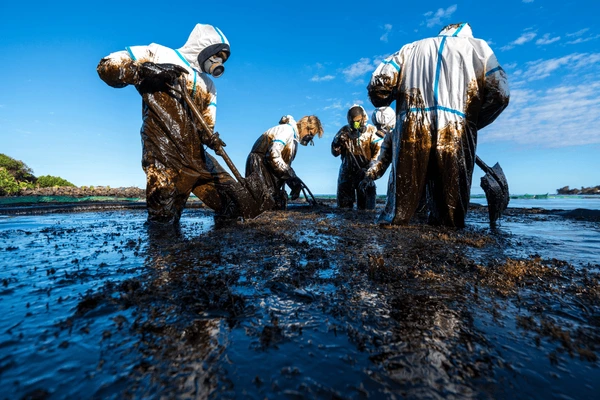Guyana is now armed with a new piece of legislation that marks a major step in managing oil-related environmental risks, as the House passed on Friday night, the Oil Pollution Prevention, Preparedness, Response and Responsibility Bill 2025.
The bill was introduced in the National Assembly by Prime Minister, Brigadier (Ret’d) Mark Phillips, who opened the debates. He explained that the legislation provides the framework to prevent oil spills through mandatory safety protocols, adding that it strengthens national preparedness; ensures timely, effective emergency response, enforces accountability among operators and offers redress to affected citizens and communities.
PM Phillips outlined that the legislation introduces a clear and enforceable framework for oil operators and facilities, and empowers national bodies like the Civil Defence Commission (CDC) to respond swiftly to oil spills. The PM described it as “visionary and progressive” and underscored that it ensures foresight, accountability and care for the environment.
“It places the burden of restoration and compensation squarely where it belongs, on the responsible party,” he told the House. He also noted that the legislation is designed to evolve with time and includes strong penalties and requirements for insurance and compensation.
Notably, the Prime Minister addressed opposition criticism of the Bill’s timing and structure. He stated, “This Bill is a direct response to the increased activity within Guyana’s oil and gas sector.” He cited a jump from seven to over 50 vessels entering ports weekly, underscoring the need to have such legislation in place.
For his part, Opposition MP Sherwayne Holder rejected the Bill, saying it duplicated measures already included in permits for offshore projects. He claimed it complicates oil spill prevention and lacks clear timelines for reporting.
“This Bill through many of these clauses seeks to complicate oil spill prevention and response rather than simplify it and one has to wonder why is that so,” MP Holder stated. He then labeled the legislation “a blatant sham, a charade, a hoax.”
Holder’s argument is that the liability provisions favour oil companies over the Guyanese people and concluded, “We cannot and will not support such a bill.”
Minister within the Ministry of Public Works, Deodat Indar, countered Holder’s claim and outlined that the legislation reflects international best practices, referencing the United States of America, 1990 Oil Pollution Act. “This document (1990 Oil Pollution Act of the USA) was used in preparations of this law that is before the House,” Minister Indar stated.
Underscoring that the legislation is nothing new, especially to oil producing nations, the minister said, “I spoke about the United States one because we tend to hold and see the USA as a benchmark…Brazil has, Saudi Arabia has, Russia has, China has legislation, Trinidad and Tobago has, Mexico, Qatar, Singapore, and the UAE, all of these regimes have oil spill legislation.”
MP Indar also contended that based on the presentations by Opposition MPs, he believes they did not properly read the bill.
Notably, Minister of Natural Resources Vickram Bharrat in his address called the legislation a tool to improve Guyana’s oil governance framework. He said the Bill adds to reforms already made, including the Natural Resource Fund (NRF) law and Petroleum Activities Act. The minister also boasted that the bill will enhance Guyana’s reputation as one of the better managed new oil producing countries.
Further, Attorney General and Minister of Legal Affairs, Anil Nandlall S.C also defended the bill, noting that it includes contents tailored for local circumstances. He said concerns over disaster preparedness and liability are directly addressed, and that the bill follows the “polluter pays principle”.
“We must learn from international best practices rather than from calamities on our own shores,” Nandlall stated.
Concluding the debates, the PM Phillips noted that the bill mandates that operators have to provide financial assurance and imposes penalties as high as $2 billion for non-compliance. It also enables affected persons to claim compensation through a structured process overseen by a designated board.
“Overall, this Bill decisively closes those gaps. It makes provisions for clear assignment of responsibility, mandates environmental restoration, and ensures that damages and associated costs are borne by the party responsible and not the public purse.
“This is especially crucial in coastal and riverine communities where the local economy and food security depend heavily on clean waters and marine life,” PM Phillips said.
The bill was then put to a vote and passed by the House.













